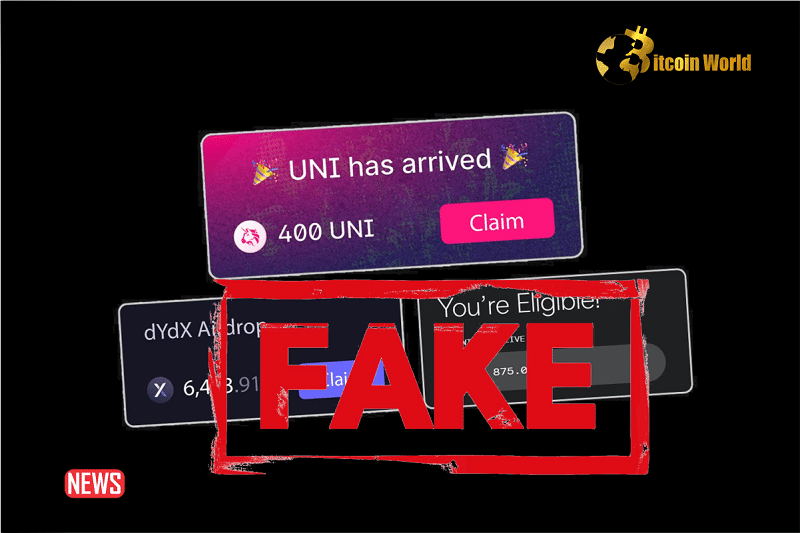The world of DeFi is exciting, but it’s also a playground for scammers. Right now, a fraudulent Uniswap airdrop campaign is making the rounds, preying on users eager for the next big opportunity. Don’t fall victim! This article will break down the scam and give you the tools to stay safe.
Fake Uniswap Airdrop: What’s Happening?
- Scammers are promoting a fake Uniswap airdrop, capitalizing on the hype around the Uniswap v4 upgrade.
- This fraudulent campaign is being spread through fake press releases on crypto news outlets.
Scammers are always looking for ways to trick users out of their money, and they often piggyback on trending topics. The recent announcement of the Uniswap v4 upgrade has provided them with the perfect opportunity.
A fraudulent press release promoting a fake Uniswap airdrop is circulating online. This is a classic example of how scammers exploit excitement and trust to deceive users.
Is Uniswap Really Giving Away $10 Million in UNI?
A press release claiming that Uniswap is airdropping $10 million worth of UNI to both old and new users to celebrate the launch of Uniswap v4 has appeared on several crypto news outlets.
This campaign is a scam. Always verify information from official sources before participating in any airdrop or promotion.
See Also: Uniswap V4 Upgrade Schedule For Release In Third Quarter (Q3) 2024

How to Spot a Fake Airdrop
Airdrops are becoming increasingly popular again, thanks to favorable crypto market conditions. However, this also means airdrop scams are on the rise. These scams, like the one targeting Uniswap users, are rampant on social media and even making their way onto reputable news sites. Here’s how to recognize them:
- Unrealistic Promises: If an airdrop promises an unusually large amount of tokens for minimal effort, it’s likely a scam.
- Requests for Private Keys: Legitimate airdrops will never ask for your private keys or seed phrases.
- Suspicious Websites: Scammers often create fake websites that mimic legitimate ones. Always double-check the URL.
- High Pressure Tactics: Scammers may try to rush you into participating by claiming the airdrop is only available for a limited time.
Staying Safe: Your Action Plan
Protecting yourself from airdrop scams requires vigilance and a proactive approach. Here’s a simple action plan:
- Verify Information: Always confirm airdrop details on official project websites or social media channels.
- Double-Check URLs: Ensure the website address is correct before connecting your wallet or signing any transactions.
- Be Cautious with Permissions: Review the permissions you grant to websites when connecting your wallet.
- Contact Support: If you’re unsure about an airdrop, reach out to the project’s official support channels.
Real-World Examples of Airdrop Scams
Understanding how these scams work in practice can help you avoid them. Here are a couple of examples:
| Scam Type | Description | Red Flags |
|---|---|---|
| Phishing Airdrops | Scammers create fake websites that look like legitimate airdrop pages. They trick users into connecting their wallets and signing malicious transactions. | Typos in the URL, requests for private keys, and high-pressure tactics. |
| Social Media Scams | Scammers use fake social media accounts to promote airdrops that don’t exist. They often ask users to send a small amount of crypto to receive a larger reward. | Unofficial accounts, grammatical errors, and promises that seem too good to be true. |
The Good News
So far, there have been no reported losses due to this specific fraudulent Uniswap airdrop campaign. However, it’s crucial to stay vigilant and protect yourself from future scams.
Disclaimer: The information provided is not trading nor financial advice. Bitcoinworld.co.in holds no liability for any trading or investments made based on the information provided on this page. We strongly recommend independent research and/or consultation with a qualified professional before making any trading or investment decisions.
#Binance #WRITE2EARN
Disclaimer: The information provided is not trading advice, Bitcoinworld.co.in holds no liability for any investments made based on the information provided on this page. We strongly recommend independent research and/or consultation with a qualified professional before making any investment decisions.




